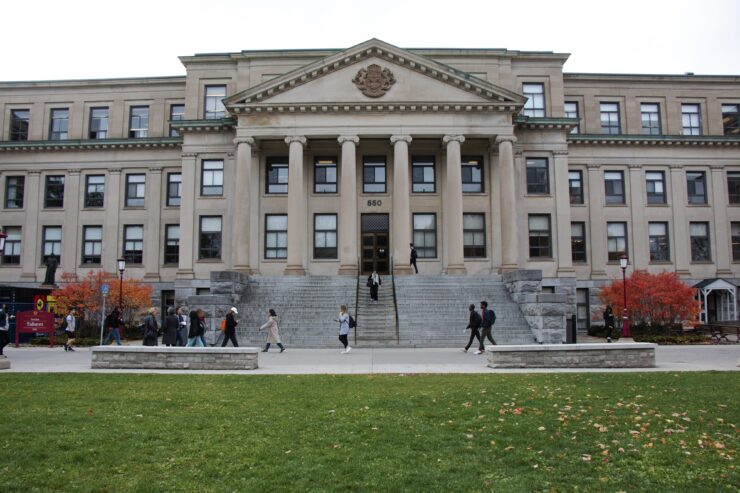Eighteen recognized student governments, eight UOSU board members sign open letter
Content warning: Suicide
Eighteen recognized student governments at the University of Ottawa, eight student union board members, and four co-founders of the uOCollective 4 Mental Health have released an open letter to president Jacques Frémont, calling on the administration to take a collaborative approach to address the ‘mental health crisis’ the school is facing.
The letter comes just days after a student death, the fifth to occur in the past 10 months. During a Tuesday press conference, Frémont also acknowledged that the school is dealing with a mental health ‘crisis’ and said that the administration is working to improve services offered to students.
“Following five student deaths over the span of 2019 and early 2020, we are listening to the voices of our community, and we echo their demands for more to be done in order to cultivate a safer learning, living, and working environment,” the letter reads, posted on Friday.
Given the current state of the mental health system on campus, the authors of the letter wrote that they “reject the self-proclamation of our campus as ‘champion(ing) mental health. ’ ”
“While we are enthusiastic about the steps taken by the central administration thus far, we urge them to recognize that those steps should be just the beginning of a comprehensive, long-term effort to address pertinent mental health concerns at the university,” reads the letter.
The authors then proposed five calls to action that the university undertake:
- Facilitate dialogue
- Adopt an intersectional approach
- Address and rectify the allowance of a Scientology exhibit to take up space on campus
- Normalize mental health and proper accommodations
- Address operational constraints
Letter to U of O President Frémont on Mental Health Collaboration by Matt Gergyek on Scribd
Facilitate dialogue
The letter asks that the university consults with members of the community to gain a better understanding of the various barriers that exist when it comes to accessing mental health resources on campus.
To meet this demand, the letter outlines three measures for the university to follow:
- “Immediately reschedule – and attend – the meeting with the uOttawa Collective 4 Mental Health, to discuss a collaborative path forward to addressing the campus mental health crisis”
- “Facilitate known and accessible forums for the community to share their experiences and concerns with accessing mental health resources, as well as suggest solutions they would like to see implemented on our campus”
- “Consider the unique mental health challenges faced by: undergraduate, graduate, and PhD students; students of different academic disciplines; international students; students living on and off residence; part-time and full-time faculty; faculty members with and without tenure; part-time staff and full-time staff; volunteers; staff working directly on campus mental health; and more. Ensure that any approach takes into account the vast realities of the University community, and is open to growing alongside it.”
Adopt an intersectional approach
The letter asks that the university acknowledge and consider how different intersections in identity — such as race, gender, and sexual orientation — can influence one’s ability in accessing mental health resources on campus.
“Commit to implementing principles of equity, diversity, and inclusion in the provision of all mental health services,” reads the letter. “Provide the proper training to ensure that mental health care professionals reflect an understanding of the diversity of our University community.”
Address and rectify the allowance of a Scientology exhibit on campus
The letter asks that the university issue an apology to members of the U of O community for allowing a Scientology linked anti-psychiatry exhibit to hold space on campus for a week in late January, which was set up just days after the school finished celebrating their annual Wellness Week.
“Work to balance the difficulties in adhering to a ‘policy about freedom of expression on the campus’ while understanding ‘(the exhibit was) hurtful to many members of the community,’ ” reads the letter.
The authors then asked that the university begin this process by donating the profits that they received from their contract with the exhibit’s organizers to local or campus-based mental health organizations.
Normalize mental health and proper accommodations
To develop a campus environment that both accepts and accommodates mental health, the letter asks that the university provide mental health sensitivity training to faculty members so that they are more cognizant of students’ mental health concerns.
“Properly brief faculty about the realities of mental health, the barriers it can create towards achieving academic success, and their role in creating a mental health judgement-free learning culture,” reads the letter.
The authors also ask that the university consider launching workshops, courses or other learning opportunities for all faculty and staff, where they can engage in “equity, diversity and inclusion training.”
Address operational constraints
In their final call to action, the letter asks that the university look into reforming any operational grievances that have been expressed by those who have had negative experiences when accessing mental health resources on campus.
Grievances highlighted in the letter includes:
- Excessive wait times on campus health clinics
- Inefficiencies within the referral system
- A lack of subsidization of mental health fee coverage
- A lack of awareness of existing programming on the campus
Additional calls to action
The authors encouraged the university to focus their attention on the four key pillars — awareness, mobilization, training and strengthening — outlined in the recently published “Roadmap to Wellness at uOttawa” report, which was produced by a mental health and wellness action group that was launched in January 2018 by Frémont.
“We would like to further emphasize the importance of prioritizing the (four key pillars), as listed in the report, as we believe they appropriately align with our concerns and associated calls to action,” states the letter.
The authors then sketched out six associated calls to action:
- Awareness: “Embed mental health and wellness at all levels into the daily business practices of the University”
- Mobilization: “Implement a stronger infrastructure for long-term collaboration, coordination & mobilization of stakeholders”
- Mobilization: “Reduce structural and systemic barriers”
- Training: “Promote and develop training and skill development opportunities that help our U of O population take care of our entire community”
- Strengthening: “Address gaps and strengthen our services and programming to improve the continuum of support”
- Strengthening: “Further invest in current services and programming”
The letter also praised the launch of a presidential task force on mental health, which is looking to engage with other universities for suggestions, partner with local hospitals, implement recommendations from the CAG’s report on wellness, and is set to hold a town hall on Feb. 27.
“We encourage proper consultation and inclusion of the diverse U of O community at this table, all who will bring unique and productive perspectives,” reads the letter.
The authors also stated that they are looking forward to working alongside the university’s central administration in immediately addressing the mental health crisis.
“As student representatives, we applaud and stand in solidarity with those who have the courage to demand a safer campus,” reads the letter. “We understand and identify with president Frémont, and acknowledge that ‘there’s so much need and (the university is) trying to be as present as possible’.”
What’s happened so far?
Students held a sit-in outside Frémont’s office in Tabaret Hall on Wednesday. The president of the university eventually met with protesters and asked them to join him if he were to go to Queen’s Park to ask for funding, to which they agreed.
Later that day, Frémont attended a town hall for the faculty of arts, where he was met with a number of students who demanded immediate action on improving the school’s mental health system and concrete next steps.
Meanwhile, student representatives on the Board of Governors (BOG) of the U of O and Carleton University are seeking a $1 million investment to improve both their schools’ mental health systems.
Another protest is planned for Feb. 28 from 9 a.m. to 12 p.m. on Tabaret Lawn.
Who signed the letter?
The 18 recognized student governments that signed the letter are as follows: the Conflict Studies and Human Rights Students’ Association, the Health Sciences Student Association, the Feminist and Gender Studies Students’ Association, the Nutrition Student Association, the Science Students’ Association, Sociology and Anthropology Students’ Association, the International Development and Globalization Student Association, L’Association des étudiantes et étudiants en droit civil de l’Outaouais, the Economic Students Association, Students’ Association of the Faculty of Arts, Computer Science Student Association, the Undergraduate Nursing Student Association, the Human Kinetics Student Association, the Criminology Students’ Association, the Communication Students’ Association, the Telfer Student Council, the Psychology Students’ Association, and International, Political and Policy Studies Student Association (which does not yet appear on the digital version of the letter).
The eight University of Ottawa Students’ Union board members who signed the letter include Babacar Faye, Tim Gulliver, Zachary Robichaud, and Zaina Abusayma from the faculty of social sciences, faculty of science director Jinnia Baiye, Daniel Kuhnreich from the faculty of law (common law section), faculty of engineering director Scott Fulton, and Rex Tshibanda from the faculty of arts.
Also among the letter signers are four co-founders of the uOCollective 4 Mental Health, launched after the fourth student death of 2019 in December, including Maxime Lê, Angela Toubis, Laura O’Connor, and Nickolas Ebrune.
More to come.
A non-comprehensive list of local mental health resources appears below…
On campus…
- University of Ottawa Health Services (UOHS), 100 Marie-Curie Private
- Offers counselling, psychiatric services, individual, couple or family therapy, access to psycho-educational groups and referrals to specialists off-campus
- Student Academic Success Service (SASS), 100 Marie-Curie Private
- Offers individual counselling, peer-counselling, workshops, online therapy and group counselling using new stepped model; referrals
- Faculty mentoring centres (locations differ by faculty)
- Specialized mentoring services catered to the needs of students in each faculty
Off campus…
- Mental health hotlines…
- Drugs and Alcohol Helpline: 1-866-531-2600
- Canada Suicide Prevention Service phone available 24/7: 1-833-456-4566
- Fem’aide: 1-877-336-2433
- Good2Talk: 1-866-925-5454
- Kids Help Phone: 1-800-668-6668 or text CONNECT to 686868
- Mental Health Crisis Line: 613-722-6914
- Distress Centre of Ottawa and Region: (613) 238-3311
- Ottawa Rape Crisis Centre: 613-562-2333
- Tel-Aide Outaouais: 613-741-6433
- Trans Life Line: 1-877-330-6366
- Walk-in counselling clinics (six Ottawa locations)…
- Somerset West Community Health Centre (55 Eccles Street)
- South-East Ottawa Community Health Centre (1355 Bank Street)
- Family Services Ottawa (312 Parkdale Avenue)
- Jewish Family Services of Ottawa (300-2255 Carling Avenue)
- Ottawa Community Immigrant Services Organization(959 Wellington St. W)
- CFS/SFC Ottawa (310 Olmstead Road)
- Community health and resource centres (13 in Ottawa)
- Carlington Community Health Centre (900 Merivale Road)
- Eastern Ottawa Resource Centre (215-1980 Ogilvie Road)
- Nepean, Rideau and Osgoode Community Resource Centre (1547 Merivale Road, Unit 240)
- Rideau-Rockcliffe Community Health Centre (225 Donald Street)
- Sandy Hill Community Health Centre (221 Nelson Street)
- South East Ottawa Community Health Centre (1355 Bank Street)
- Western Ottawa Community Resource Centre (2 MacNeil Court)
- Centretown Community Health Centre (420 Cooper Street)
- Lowertown Community Resource Centre (40 Cobourg Street)
- Orleans-Cumberland Community Health Centre (240 Centrum Boulevard)
- Pinecrest-Queensway Community Health Centre(1365 Richmond Road)
- Somerset West Community Health Centre (55 Eccles Street)
- Vanier Community Service Centre (270 Marier Avenue)
Warning signs of suicide include:
Talking about wanting to die
Looking for a way to kill oneself
Talking about feeling hopeless or having no purpose
Talking about feeling trapped or being in unbearable pain
Talking about being a burden to others
Increasing use of alcohol or drugs
Acting anxious, agitated, or recklessly
Sleeping too little or too much
Withdrawing or feeling isolated
Showing rage or talking about seeking revenge
Displaying extreme mood swings
The more of these signs a person shows, the greater the risk. If you suspect someone you know may be contemplating suicide, you should talk to them, according to the Canadian Association for Suicide Prevention.






